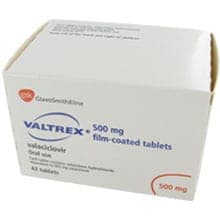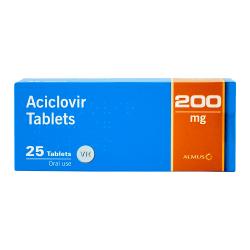Login to your account
- Prescription included
- Genuine medication
- All-inclusive service - No hidden fees
- Free next-day delivery
Shingles
Get shingles medication with an online prescription
Shingles is a painful rash caused by the strain of the herpes virus. It tends to be more common in older adults. In fact, 68% Trusted source Neurology Peer-reviewed Journals Neurology Clinical Neuroscience Journal Go to source of global shingles cases occur in people over 50 years of age. Shingles can make you feel quite unwell and uncomfortable, so it’s typical for people to seek antiviral treatment shortly after they notice symptoms appearing. Here at euroClinix, you can buy several different antiviral drugs for shingles.
Available Treatment(s)

- Works quickly for symptomatic relief from cold sores, genital herpes and shingles
- Can be taken as a preventative treatment for cold sores and genital herpes
- Easy to take tablet form

- Taken within the first 24 hours of an outbreak to provide the most effective results
- Can be used to ward off future attacks of genital herpes and cold sores
- Quickly alleviates uncomfortable symptoms

- Can significantly reduce the recovery time of a herpes outbreak
- Provides timely relief from painful and uncomfortable symptoms
- Can be taken as a preventative treatment for cold sores and genital herpes
What causes shingles?
Shingles is a viral infection caused by a strain of herpes known as herpes zoster or the varicella zoster virus (VZV) which many contract when they’re young from having chicken pox. This is unlike the herpes simplex virus (HSV), which causes cold sores (HSV-1) and genital herpes (HSV-2) as these are normally acquired through physical contact.
In general, most people recover completely from chickenpox without any ill effects or further outbreaks, but the herpes zoster virus still remains in the body. For the majority of people, the virus will remain inactive for the rest of their life. However, sometimes the virus reactivates and this is what causes shingle symptoms.
The reasons why the virus gets reactivated as shingles is not entirely clear. The most plausible theory is that it's as a result of a weakened immune system. This is why certain people are at a high risk of getting shingles.
Risk factors for shingles may include:
- having a condition that weakens your immune system (e.g HIV and AIDs)
- taking certain medications such as steroids or drugs designed to prevent organ rejection after an organ transplant
- being older than 50
- undergoing cancer treatment (radiation or chemotherapy)
Are shingles infectious or contagious?
Unlike most other infections caused by the herpes virus, shingles is rarely contagious. More specifically, you cannot pass the virus onto someone who has had chickenpox before as they will already have the virus in their body. Similarly, you cannot contract shingles from someone who has chickenpox.
However, you can spread the virus and cause chickenpox in those who have not had it as a child or who have not had the chickenpox vaccine, typically via direct contact with an open shingles sore. If you think you have shingles, you should be cautious around:
- infants and children
- pregnant women who have not had chickenpox
- those with weakened immune systems
What are the symptoms of shingles?
The first signs of a shingles symptom outbreak are usually a severe pain, burning or tingling sensation in a specific area, which is then followed by a fever.
Around two to three days after these initial symptoms, a rash appears on one side of the body most likely the chest or the stomach. In some cases, a shingles rash can appear on the side of the face and the eyes, affecting the nerves surrounding the eyes (ophthalmic zoster) and ears (Ramsay Hunt Syndrome).
A skin rash can often be difficult to diagnose, as many conditions can cause similar symptoms. However, shingles rashes have several distinguishing features and a particular progression:
- only occurs on one side of your body / face
- start as red patches on the skin
- become itchy, fluid-filled blisters
- blisters then dry out and scab after a few days
- shingles on the eyes/face can cause vision, hearing and facial movement difficulties (facial paralysis)
If you are not sure whether you have these symptoms, you should speak to your doctor or a healthcare professional as soon as possible.
Are there any complications of shingles?
The most notable complication of shingles is a neurological condition called ‘post-herpetic neuralgia’. It affects up to 1 in 5 people who get shingles and it causes severe nerve pain, sensitivity, tingling and numbness on the area of skin where the rash used to be. People experience this condition months and sometimes years after the rash has disappeared.
Post-herpetic neuralgia is caused by the virus damaging the nerve fibres at the site of the rash. This affects the nervous system and how your body senses pain, and causes exaggerated pain signals to be sent to the spinal cord and up to the brain. This causes you to feel pain, even when there is no virus active in your body.

Other complications of shingles are extremely rare, only occurring in less than 1% of cases of shingles. These include:
- pneumonia
- vision loss - caused by shingles affecting the nerves around the eyes (ophthalmic zoster)
- hearing loss - caused by shingles affecting the nerves around the ears (Ramsay Hunt Syndrome)
- brain inflammation (encephalitis)
However, any risk of complications is significantly reduced if antiviral treatment is used within 3 days of symptoms appearing.
How do I treat shingles?
The only way you can treat a shingles outbreak is by using antiviral drugs. These medicines work by stopping the viral cells from reproducing and they help the body’s natural defences to fight it off, forcing the shingles virus into a dormant state. There are several different antiviral medicines available on prescription, including Aciclovir (Acyclovir), Valaciclovir (Valtrex) and Famciclovir (Famvir).
You can also take other medications to help with the uncomfortable symptoms such as painkillers like ibuprofen or paracetamol for the nerve pain, or lotions (such as calamine lotion) for the itching. You can also use a cold compress on the rash a few times a day to help with the itching. You should also keep the rash clean and dry to avoid infection, and avoid any antibiotic or antiseptic creams as they can slow down healing.
How do I prevent shingles?
Shingles vaccines (zoster vaccines) are available for those over the age of 50 to prevent shingles outbreaks, and are offered for free to those who are aged between 70-79 on the NHS. They can cause some side effects (sore arm and a slight headache) but they do not give you shingles. There are two main types of vaccines that work in slightly different ways, but both guarantee long-term protection.
Zostavax is the vaccine recommended for most people. It’s a live vaccine, meaning it contains a weakened form of the herpes zoster virus, which enables your body to fight off the virus and develop immunity to it. However, it’s not suitable for people with weak immune systems.
These people are, instead, offered the non-live equivalent known as Shingrix. It works similarly to Zostavax but contains an additional ingredient which helps to boost your immune response to the vaccine. You will only need one dose of Zostavax, but will require 2 doses of Shingrix for full protection.
How do I buy treatment online?
Here at euroClinix, we offer several prescription antiviral medications including Aciclovir, Valaciclovir (Valtrex) and Famciclovir (Famvir) for the treatment of shingles. All you have to do is fill out a quick, confidential medical questionnaire that is reviewed by one of our registered doctors. Once approved for treatment, your medication will be dispensed and dispatched by our pharmacy with free next-day delivery.
Further reading

The signs and symptoms of shingles
Reviewed by Dr. Plauto FilhoSelect
medicationFill out a short
medical formDoctor issues
prescriptionMedication sent
from pharmacy



